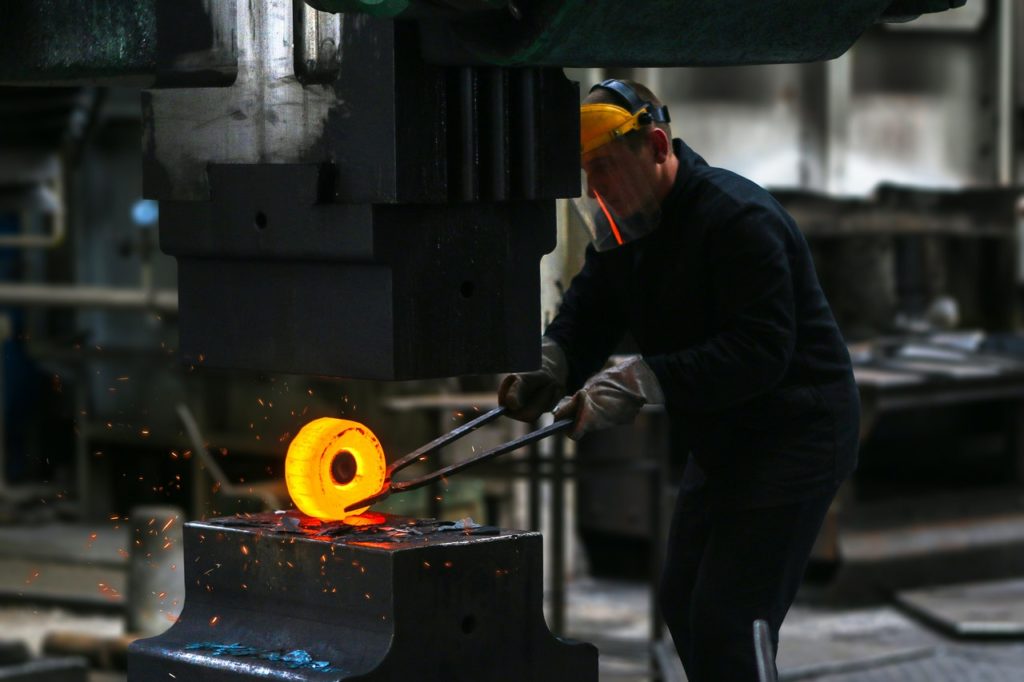Will you be able to manufacture a career in one of these disciplines? Read on to compare mechanical vs manufacturing engineering and find out if one of these career paths will be for you!
First, if you’re looking to launch your own blog and start writing articles yourself, no matter what the subject, you can launch your blog with Bluehost for just $3.95/month.
Start creating content and launch your blog with Bluehost.
Mechanical Engineering
Mechanical engineering is known as the broadest and most diverse engineering branches, going into the past to when wheels were first put into use by installing them onto an axle to create a cart. Over the years, people have built and invented more sophisticated machines and devices in an effort to increase their quality of life. A lot of machines we use every day: appliances, cars, HVAC systems and tools, were developed by mechanical engineers, on software programs like AutoCAD, Revit, Inventor and Fusion 360.
The main inspiration for developments in the mechanical engineering field, especially in its first stages, was war, the Viterbi School of Engineering in the University of Southern California states. Mechanical engineers can develop basic products that a normal person would make use of, or other very high-end products for the government or military.
Battering rams, catapults, siege towers and chariots are all creations of mechanical engineering. A lot of modern warfare’s machines, like ships, artillery, aircraft, armored vehicles and firearms, were all created by mechanical engineers.
The most well-known mechanical engineers throughout history include: Archimedes (Archimedes block and tackle pulley, screw pump etc.), James Watt (steam engine), Johannes Gutenberg (printing press), Robert Fulton (steamboat), Henry Ford (automotive assembly line) and Eli Whitney (cotton gin).
Manufacturing Engineering
Manufacturing engineering is a professional engineering branch that has many common concepts and ideas with other engineering fields like chemical, mechanical, industrial and electrical engineering, which prompted this mechanical vs manufacturing engineering post! Manufacturing engineering needs the ability to plan the manufacturing practices; to develop and research the use of machines, equipment and processes: and to merge the systems and facilities for creating quality products at the right price.
The manufacturing (also known as production) engineers main aim is to convert raw materials into an updated or new product/device in the most efficient, economic and effective way possible. Manufacturing engineering is built around core mechanical engineering and industrial engineering skills, incorporating elements from commerce, mechatronics, business management and economics. This industry also includes the merging of different systems and facilities for the production of well-made products by utilizing the fundamentals of physics and the results of manufacturing systems studies, like:
- American system of manufacturing
- Lean manufacturing
- Mass production
- Prefabrication
- Publication
- Computer integrated manufacturing
To name a few.
Manufacturing engineers create and develop physical artifacts, technology and production processes. It is a very diverse field which includes the development and design of products/devices. Manufacturing engineering is known to be a sub discipline of systems engineering/industrial engineering and has a lot in common with mechanical engineering. This manufacturing engineering field emerged from the tool and die discipline that was around in the early 20th century, since then it has grew significantly from the 1960s within industrialized countries.

Mechanical vs Manufacturing Engineering Careers
Mechanical Engineering
The BLS states; mechanical engineers are typically employed in a professional office setting. They might visit work sites from time to time where an issue or machine needs their expertise. Mechanical engineers mostly work in manufacturing industries, research and development, engineering services and the government.
For nearly all occupations, mechanical engineers will be required to have at least an engineering bachelors degree, and most employers, especially those that are providing consulting services to customers, also need Professional Engineer (PE) certification. A masters degree is regularly needed for consideration for advanced positions, and ongoing training and education are required to stay up-to-date with technology advances, computer software and hardware, government regulations and materials. Quite a few mechanical engineers also are a member of the American Society of Mechanical Engineers. Another way to stay on top of the latest technologies and skills is to take an online course on a platform like LinkedIn Learning, which offers a certificate once a course is completed and is free for the first 30 days!
Salary.com reports that the salary bracket for a recently certified mechanical engineer possessing a bachelors degree is from $52,626 – $74,524. The expected salary for an engineer possessing a masters degree and 5 – 10 years of work experience comes in at $73,238 – $108,609. Finally, the salary range for a well-established engineer possessing a masters/doctorate and 15 years or more of hard work is from $95,251 – $141,806. A lot of knowledgeable engineers with post-graduate degrees are usually advanced to positions in management, or they can form their own company so they can receive more than the previously stated figures.
Manufacturing Engineering
The Occupational Outlook Handbook states that job prospects for the manufacturing field are very promising. A lot of occupations will have to be hired for that become open due to older staff retiring, being promoted, and leaving. A good number of manufacturing engineers become technical specialists or go into a sales specialist position, some others will find themselves in managerial positions.
A manufacturing engineer can be found working in a plant, office, factory, construction site, an oil/gas production site or laboratory. Manufacturing engineers typically work the usual 40 hour work week with the option for overtime, which occurs from time to time. Generally benefits packages, like dental, medical, vision, paid vacation, sick leave, pensions and 401K plans, are normal for the industry, which also includes frequent travelling. A manufacturing engineer might need to travel oversees to do their job.

Payscale.com states that the median salary for manufacturing engineers is from $42,444 – $84,634 every year.
Mechanical vs Manufacturing Engineering Education
Mechanical Engineering
The initial qualification that you need to become a mechanical engineer is to obtain your undergraduate degree from a course accredited by the ABET, the Accreditation Board for Engineering and Technology. A bachelors degree in mechanical engineering is the norm for entering the industry, but students can also get a degree in mechanical engineering technology if desired. Any undergraduate mechanical engineering course will involve a good amount of coursework in design, engineering, life sciences, math and physical sciences, the United States Bureau of Labor Statistics (BLS) states.
While prospective engineers will have to study engineering principles and theory, they should also be prepared to spend a lot their time utilizing those principles in real-world situations. Engineering courses are tough and often need – or advise – students to get real-world work experience through co-op placements and internships. It’s not strange for students to need five/six years to finish mechanical engineering degrees, even in courses that could be completed in four years, according to the BLS.
For mechanical engineers, just a bachelor’s degree is usually enough preparation for them to enter the engineering world. Their undergrad degree has taught them the theory that they must know and how to utilize it in their career. Certain jobs in the mechanical engineering field look for a master’s degree however. For positions in academia such as jobs in high-level research and development and college jobs, employers might only consider engineers who possess a graduate degree. A few ambitious mechanical engineers might obtain a degree in another relevant field, such as business administration, in order to promote themselves to management jobs.
While some students obtain work experience before returning to school for their post-grad course, others continue on to graduate school right away. If you are aware that grad school is a part of your goals for the future, a five/six year degree that gives you the chance to complete both degrees at the same time may be the right option for you.
Manufacturing Engineering
The U.S. Bureau of Labor Statistics (BLS) states, that an engineering bachelor’s degree is a necessity for nearly all engineering occupations. Prospective manufacturing engineers should attempt to specialize in a field like industrial engineering. For example, an industrial engineering program accredited by the ABET prepares engineers for manufacturing engineering careers with programs in industries manufacturing process design, manufacturing systems operations and quality control.

An engineering bachelors degree might qualify you for entry-level manufacturing engineering employment. However the BLS has said that a post-grad degree is required for all engineers who plan on conducting research, teaching, or obtaining higher-level positions in management. Having a master’s degree will also aid manufacturing engineers in learning about newer theories and technologies.
A few colleges have Masters of Science in Industrial Engineering that are practice-oriented with a manufacturing engineering concentration. It also includes a Master of Science in Industrial Engineering that is theory-oriented, with an concentration in manufacturing engineering. Courses in these degrees cover subjects in metal cutting theory, metal casting and the controlling of manufacturing systems with computers. Students can choose to do a thesis or to complete a non-thesis option.
Although not a necessity, getting certified as a manufacturing engineer can help engineers stay on top of on industry developments and improve their careers, the Society of Manufacturing Engineers states. This professional society gives out the Certified Manufacturing Engineering Certification. To earn this certificate, manufacturing engineers that have more than eight years of engineering-related work experience and education must pass a four-hour long examination that tests both career-specific and general knowledge.
Mechanical vs Manufacturing Engineering Job Description
Mechanical Engineer
Mechanical engineering is one of the broadest engineering disciplines, according to the US Bureau of Labor Statistics (BLS). Mechanical engineers have to have a fundamental knowledge of multiple other fields of engineering, including aerospace, computer, electrical and structural engineering. They should also know a little about control and instrumentation, materials and manufacturing processes so they can design products that can be developed effectively and at an affordable cost.
There are some important skills that are required in mechanical engineering, and these include a good knowledge of math, materials and physics. This information gives engineers the ability to calculate the conditions of failure based on the part’s dimensions, the material’s properties and its operating conditions. A mechanical engineer can then chose the necessary materials and dimensions of a product so it will be able to hold up to specific forces.
Engineers typically utilize many different types of materials; ceramics, metals, composites and polymers. It is essential for mechanical engineers to be taught how various materials have different mechanical behaviors. Being aware of the material’s properties, like their hardness, density, bulk modulus, bending and tensile strength, gives mechanical engineers the ability to calculate how the various materials will react under stresses/forces such as tension, bending, twisting and compression as well as under different environmental conditions like corrosive gases, temperature, pressure and even radiation.
Manufacturing Engineer
Manufacturing engineers, also known sometimes as industrial engineers, focus entirely on the automated aspects of manufacturing processes. They design manufacturing systems to optimize the use of computer networks, materials and robots. Industrial engineers concentrate on how to get the job done most effectively, balancing multiple aspects, like the time, number of workers needed, tasks workers need to complete, available technology, workers safety, environmental concerns, cost and achieving the goal with as little errors as possible.

The versatility of industrial engineers allows them to participate in multiple activities that are utilized by a variety of nonprofits, businesses and governments. As an example, industrial engineers are involved in the management of the supply chain in order to aid businesses reduce the cost of inventory, carry out quality assurance activities to aid businesses keep their customers happy, and they also work in the project management field that is growing in popularity as areas across the economy attempt to control/reduce costs and maximize their efficiencies.
Manufacturing engineers need a bachelors degree, typically in industrial engineering. However, many manufacturing engineers have degrees in electrical engineering, mechanical engineering, general engineering or industrial engineering technology. Students interested in studying industrial engineering should take school courses in mathematics, such as trigonometry, algebra and calculus: computer science: and sciences such as physics and chemistry.
Thank you very much for being here – we appreciate you taking the time to read our content. If you have anything to add, please feel free to leave a comment down below, and sign up to our newsletter for more of the same!
You can also follow us on LinkedIn, Facebook, Twitter, and Instagram so you can stay up to date.




Mechanical engineering has always been to increase production, improve labor productivity and improve the economy of production, that is, to develop and develop new mechanical products with the goal of improving human interests. In the future era, the development of new products will take reducing resource consumption, developing clean renewable energy, controlling, reducing and even eliminating environmental pollution as the super economic goal and task.